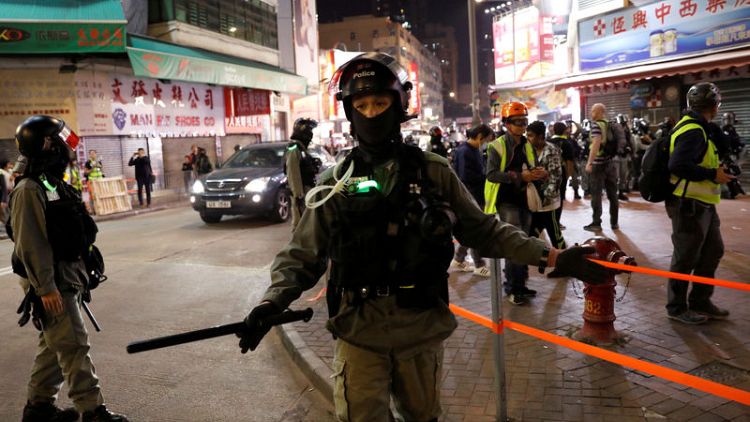By Donny Kwok, Clare Baldwin and Alun John
HONG KONG (Reuters) - Inside the increasingly empty and trashed campus of a Hong Kong university only a handful of activists held out on Thursday as they desperately searched for ways to escape or hide while squads of police encircled the grounds.
Hong Kong's Polytechnic University is the last campus still occupied after a week that has seen the most intense violence since anti-government protests escalated more than five months ago.
Demonstrators are angry at what they see as Chinese meddling in freedoms promised to Hong Kong when the former British colony returned to Chinese rule in 1997. Beijing has said it is committed to the "one country, two systems" formula granting Hong Kong autonomy.
For more than a week-and-a-half, hundreds of protesters had fortified Polytechnic University's Kowloon peninsula campus and often fought fiery street battles with riot police.
But now the number of protesters has dwindled to fewer than 100, turning the grounds that normally teem with 33,000 students and staff into an eerily empty compound scattered with debris and defaced with political slogans.
"I am by myself, all my peers have left, but I am too scared to escape," said Yan, a man in his 30s who said he had been helping in the canteen used by the protesters during the siege.
Unshaven and shoeless, Yan said he was avoiding contact with the handful of others still on the campus because he feared running into undercover police.
He had been hiding in a building for the past two days, and when he heard the sound of Reuters journalists approaching tried to take cover in a stationery cupboard.
"I don't dare to walk around, I don't talk to people," he told Reuters. "I feel scared and helpless. I am stuck."
Another young protester clad in makeshift body armour was patrolling the grounds armed with an axe, saying he was on the lookout for a dozen undercover officers he suspected had infiltrated the campus.
UNEASY CALM
Hong Kong has had a brief respite from months of often violent demonstrations, with relative calm across the city for the past two days and nights ahead of a district council election set for Sunday. The government says it is monitoring the situation to see whether the election can be held safely.
Police said they were committed to a peaceful solution and "flexible approach" to ending the university stand-off, and called on the remaining protesters to leave in an orderly manner, promising they would be guaranteed fair treatment.
Some protesters have surrendered while others were held during escape attempts that included clambering down from a bridge to waiting motorbikes and fleeing through the sewers. More than 1,000 have been arrested or registered by police.
Much of the campus is damaged, with rooms vandalised and windows shattered, though electricity and water are still functioning. In a library, most books were untouched but makeshift petrol bombs were left on desks.
Some protesters told Reuters they were holding out not for a showdown with police, but because they were innocent and looking for an escape route.
"I won't consider surrendering. Surrendering is for people who are guilty. None of us inside are guilty," said Michelle, a 20-year-old student.
Graffiti sprayed on campus buildings read: "I have nothing to lose. I have no stake in society."
One protester, dressed in black with gloves, elbow and knee pads, had about a dozen colourful lighters strapped to his chest, apparently to light petrol bombs. He told Reuters the hold-outs were discussing what to do next.
In the past two weeks, protesters have torched buildings, a footbridge, mass transit stations and toll booths at the city's Cross Harbour Tunnel linking Hong Kong island to Kowloon.
The protesters say that they are angry at the way the MTR, Hong Kong's public rail network, has helped riot police, and shutting down key infrastructure forces the government to listen to their demands for universal suffrage and an independent inquiry into police violence, among other things.
The Cross Harbour Tunnel remained shut because of extensive damage, authorities said.
'ERRONEOUS SIGNAL'
China has accused the United States and Britain of stirring up trouble in Hong Kong and criticised the U.S. House of Representatives for passing two bills aimed at supporting the protesters and sending a warning to China about human rights.
China opposed the bills and would never allow anyone to undermine the "one country, two systems" principle, or to destroy Hong Kong's prosperity and stability, senior Chinese diplomat Wang Yi said.
China's state Xinhua news agency said a top Chinese official in Hong Kong, Xie Feng, had summoned the U.S. consul-general to denounce the legislation as gross interference and a violation of international law.
The Hong Kong government said the bills would harm Hong Kong's relations with the United States.
"The two acts will ... also send an erroneous signal to the violent protesters, which would not be conducive to de-escalating the situation," the city government said.
Anger over the U.S. legislation, which President Donald Trump is expected to sign, comes as the two countries are locked in delicate trade talks.
(Reporting by Donny Kwok, Clare Baldwin, Clare Jim, and Alun John; Additional reporting by Tom Lasseter; Writing by Farah Master and Josh Smith; Editing by Anne Marie Roantree, Robert Birsel, Giles Elgood and Alex Richardson)
